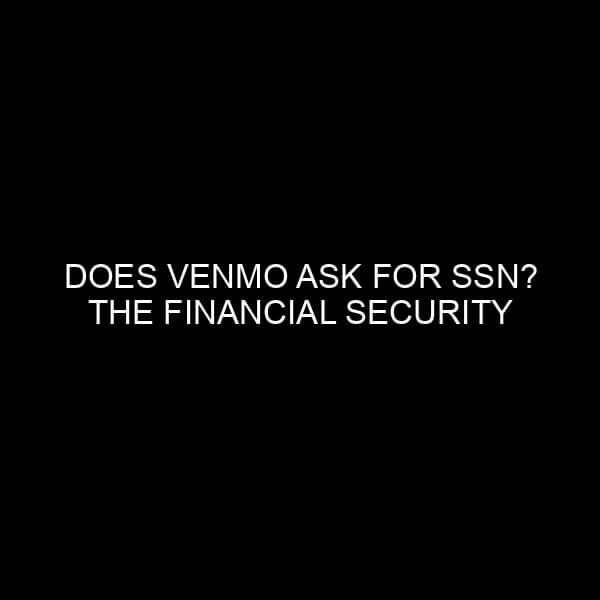Does Venmo Ask for SSN? The Financial Security Behind Venmo’s Identity Verification
As the financial market evolves, digital wallets and peer-to-peer payment apps are rapidly transforming the way we transact. Among the plethora of mobile payment options, Venmo, a popular app in the U.S., has emerged as a favorite for many. However, as with all financial platforms, questions about user privacy and security often arise. One of the most common concerns is whether Venmo asks for a Social Security Number (SSN) and, if so, why. This article, backed by insights from the financial market and banking industry, aims to unravel the reasons behind this.
Introduction to Venmo and Its Growing Popularity
Launched in 2009 and acquired by PayPal in 2013, Venmo has transformed the way people split bills, share expenses, and send money to friends and family. Its user-friendly interface, combined with social features, makes sending money as simple as sending a text message. However, with its rising popularity, Venmo, like other financial platforms, has a responsibility to ensure the security of its users and comply with federal regulations.
Understanding the Need for SSN in Financial Transactions
1. Compliance with Federal Regulations:
In the U.S., financial institutions, including Venmo, are required by law to adhere to the Bank Secrecy Act (BSA) and the USA PATRIOT Act. These regulations mandate institutions to implement rigorous measures to prevent money laundering and combat the financing of terrorism. As a part of these measures, they need to collect specific information from users, often referred to as Know Your Customer (KYC) protocols.
2. User Identity Verification:
One of the key components of KYC is user identity verification. This process helps ensure that the person creating an account or conducting a transaction is indeed who they claim to be. By asking for a user’s SSN, Venmo can cross-reference this with other provided information to validate a user’s identity.
3. Fraud Prevention:
By verifying users through their SSN, Venmo can significantly reduce the risk of fraudulent activities on their platform. Identity verification acts as a deterrent for bad actors who might want to use the platform for illicit activities.
4. Establishing Account Limits:
Financial platforms often have transaction limits. Venmo, for instance, has a rolling weekly limit on the amount of money you can transfer in and out. For users looking to have higher transaction limits, providing additional information, such as an SSN, might be required.
But Does Venmo Actually Ask for SSN?
Yes, Venmo does ask for SSN. However, this is typically requested under specific circumstances:
- When you’re nearing a transaction volume limit: If you’re nearing Venmo’s standard transaction volume limit, the platform might ask for your SSN to ascertain your identity and assess whether the limit can be increased.
- Setting up a business profile: Business accounts usually have different transaction volumes and require additional verification. As such, you might be asked for your SSN during setup.
- Receiving a Venmo debit card: If you apply for a Venmo debit card, you’d need to provide more comprehensive details, including your SSN.
Safety of Providing SSN to Venmo
Given that cyberattacks and data breaches are increasing, it’s natural for users to be wary of sharing their SSN. However, Venmo, being under the PayPal umbrella, uses advanced encryption and security measures to protect user data. While no online platform can claim to be 100% secure, Venmo’s adherence to industry standards and its commitment to user safety make it a reliable platform.
Conclusion
In the digital age, where convenience is king, platforms like Venmo have found a solid footing. However, with the convenience also come concerns about safety and data protection. While Venmo does ask for SSN in specific situations, it’s driven by regulatory compliance and a commitment to user security. As always, users should be cautious and ensure they’re providing personal information on official platforms and not phishing sites posing as Venmo. Armed with knowledge and vigilance, you can enjoy the benefits of digital transactions without compromising your security.






